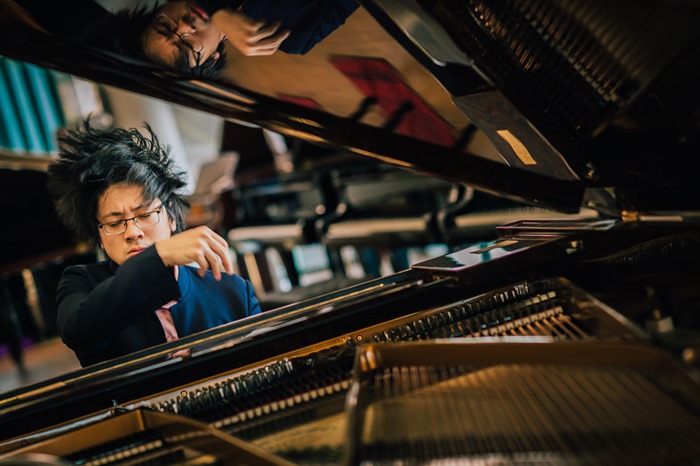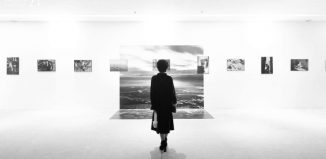Pianist Luu Hong Quang: Techniques and methods are not made to be boasted
Written by ULY and H.H for Hanoi Grapevine
All rights reserved by Hanoi Grapevine, Maestoso and Luu Hong Quang. Kindly refrain from quoting and/or reposting without permission under any circumstances.

Hanoi Grapevine sat down with the talented young pianist Luu Hong Quang to talk about the concert Piano Series No.3 – ÉVOLUTION hosted by Maestoso, taking place at 8pm on Wednesday 03 Oct 2018 at Hanoi Opera House.
Luu Hong Quang, a student of pianist Dang Thai Son, is an excellent young pianist who received numerous international awards from Japan, Australia, Germany, Italy,… He received a third-class Labor Order from the Vietnamese government for his achievements in music. He is now the youngest lecturer at the Academy of Music and Performing Arts (AMPA) in Australia.
How frequent do you have a performance in Vietnam?
I go back home to perform once or twice a year, in both Northern and Southern regions, some times I play solo and other times I perform with an orchestra.
Is playing for the Vietnamese audience different than for an international one?
The Vietnamese audience is on their way to integrate with the classical music scene in the word, and there is this young, exciting energy from them that inspire the artist to take the listeners into these classic music pieces in a brand new way.
You have also performed with orchestras from different countries, what are the differences between them according to you?
In general, each orchestra depends much on the conductor. Foreign orchestras have a certain stability and are fast adapting with the solo artist, whereas Vietnamese ones have their own exceptional moments, this is what I witnessed when I played with Hanoi Philharmonic Orchestra in Tokyo. Of course, foreign orchestras have grand advantages in regard to facilities, concert halls, and frequent schedules.
Is the selection of music pieces in the upcoming concert made according to the taste of the Vietnamese audience?
I design a balanced program with a diverse and contrast range of works for both the grand public and the field experts.
Could you tell us why you chose to premiere the full 5 Bagatelles Suite by the Australian contemporary composer Carl Vine?
I feel quite excited introducing to the Vietnamese audience an aspect of contemporary music – especially one from Australia, where I pursued my study. The pieces have a unique and unorthodox musical languages, with the fifth piece ending the suite written in as a tribute to HIV victims.
Which contemporary composers or music development trends that catch your attention right now?
I haven’t performed many pieces written after the 20th century, because personally I feel like the content and the sound of classical, romantic music are closer to my heart and soul. However, I respect transformation and the change of perspective from the 20th- and 21st-century composers. Recently I discovered the works by Russian composer Prokofiev, which were very interesting, so maybe I will perform more of his works in the future.

How do you evaluate your own style and your stand on the classical music scene? Do you want to do something new or do you want to follow the traditional way?
I am still young and still need a lot more experience both in performing and developing my work. However, I am no longer a student, now I aim for perfection of musical intent and a mature state of the musical expression. Personally I truly respect the works of composers and, with all my effort, play the piece according to the message of the composer rather than however I want to. There should be certain freedom within an appropriate framework that allow me to do things different than some other artists, but with aesthetics and a right “dosage” of difference for the piece.
Having been a student of pianist Dang Thai Son, what have you learnt from him?
What I’ve been lucky to learn from my mentor is pure sincerity when making music, no flamboyance, no unpretentiousness, but straight forward to the music content. The end goal of every technique, every method is not to show off but to breathe soul into the music.
You have won in many piano competitions, which do you consider the most important to you?
I learned tremendously from each competition, regardless of its result. Perhaps the most memorable one is the Lev Vlasseko piano competition in Australia, because it is a stepping stone for me to gain more confidence and experience to participate in other competitions later on.
Lev Vlassenko is an Oceanian piano competition for professional artists aged 18 to 30, with a total of 4 rounds and the final round is a performance with the Australian Queensland Symphony Orchestra. I was 20 years old at the time and was lucky enough to win 4 additional prizes, including Best Performance of a Work by Chopin, Best Performance of a Work by Liszt, Best Performance of a Classical Sonata, and Best Recital.
How is it important to you to constantly participate in these many competitions?
The most important thing to do when you are competing is to prepare, and in this preparation is when you perfect your art and unlock your own potential that is difficult to see in normal situation. The preparation for a big event within a defined amount of time while having to ensure the highest level of professional and artistic quality will help every artist honing their art of performing and see clearly their strengths and weaknesses.
You were awarded the third-class Labor Order, what does it mean to you?
For me, art must be for art’s sake, not for awards nor fame. However when I received this Order from the Prime minister, I felt extremely happy and honored, not for myself, but for the fact that the Ministry of Culture and the government have taken an interest and started to recognize the contribution of classical music artists.
Why did you and Maestoso choose the charity program “Cặp lá yêu thương” as the beneficiary of the concert?
This is a program aiming to support poor children in order for them to go to school. I was lucky to study abroad since a young age and was aware of the importance of education. In our country, there are an abundance of young talents with great potential that need to be discovered and nurtured. And education is an indispensable part in the nurturing process.
What is the importance of EVA Airway’s sponsorship to the concert quality, to the audience and the artists themselves?
Classical music requires a high level of refinement in sound quality, and so it must be enjoyed in an appropriate environment with the high-quality instruments to “resonate” with the artists to produce the most refined sound. Thus the sponsorship of the 5-star EVA Airways for a concert night at Hanoi Opera House plays a decisive role in creating the quality sound in a standard artistic environment for the audience. Once again, I would like to send my gratitude to EVA for accompanying me and Maestoso in this concert./.
Thank you very much.
Translated by Hanoi Grapevine
















